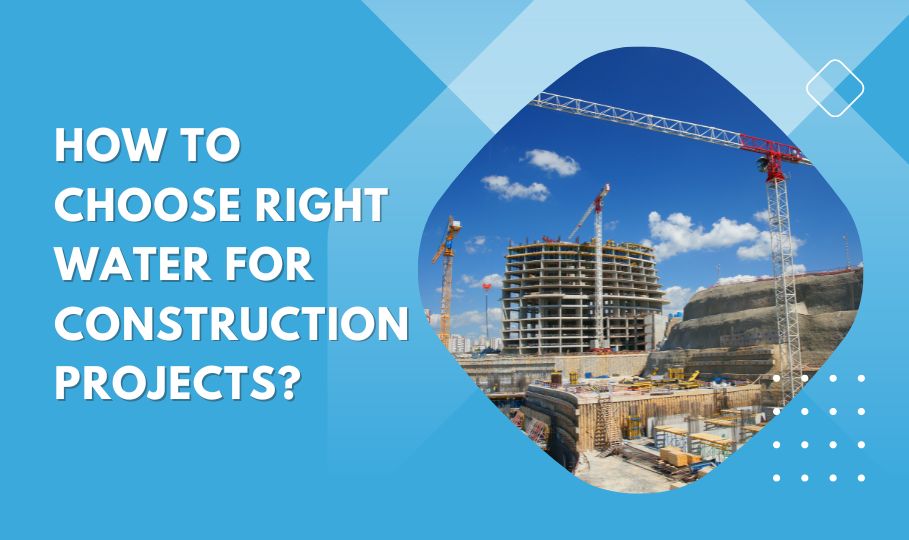Introduction
In the vast landscape of construction projects, the importance of water cannot be understated. From mixing concrete to dust suppression and soil compaction, water plays a crucial role in ensuring successful outcomes in the construction industry. However, not all water sources are created equal. Selecting the right type of water for construction projects requires careful consideration of various factors. Let’s explore the essential guide to choosing the right water for construction projects.
Importance of Sweet Water in Construction
Water is not just essential for sustaining life but also for sustaining structures. The quality of water used in construction directly impacts the integrity and longevity of buildings and infrastructure. Potable or sweet water, free from contaminants and minerals, is typically preferred for construction activities to avoid undesirable outcomes such as efflorescence, corrosion, or reduced concrete strength.
Factors to Consider When Selecting Water Sources
Choosing the appropriate water source involves evaluating factors such as quality, availability, cost, and environmental impact. Each type of water source has its own set of advantages and challenges, making it crucial to weigh these considerations before making a decision.
Overview of Common Water Options for Construction
Common water sources for construction projects include municipal water supply, groundwater, and surface water. Each source comes with its own characteristics that must be understood to determine the most suitable option for a particular project.
Quality of Water Sources
Municipal Water Supply
Pros and Cons of Using Municipal Water
- Pros: Consistent quality, convenience, reliable supply
- Cons: Potential contaminants, cost considerations
Water Treatment Requirements for Municipal Sources
- Chlorination, filtration, testing for pH levels and hardness
Cost Considerations for Municipal Water
- Water rates, connection fees, and ongoing charges
Groundwater
Advantages and Disadvantages of Groundwater
- Advantages: Typically clean and free from chemicals
- Disadvantages: Risk of contaminants, potential mineral content
Testing and Treatment of Groundwater
- Conducting water quality tests, installing filtration systems
Potential Environmental and Legal Issues
- Abiding by regulations, avoiding over-extraction, preventing pollution
Surface Water
Utilizing Lakes, Rivers, and Ponds for Construction
- Cost-effective alternative for large-scale projects
Challenges of Using Surface Water
- Seasonal availability, risk of pollution, treatment requirements
Best Practices for Treating Surface Water
- Sedimentation, filtration, and disinfection methods
Special Considerations for Specific Projects
High-Rise Buildings
Water Requirements for Tall Structures
- Pumping pressures, plumbing considerations
Risks of Contamination in High-Rise Construction
- Stagnant water, plumbing system maintenance
Solutions for Addressing Water Needs in Vertical Projects
- Water storage tanks, booster pumps, regular flushing
Road Construction
Water Quality for Road Paving and Compaction
- Dust control, asphalt mixing requirements
Environmental Impact of Water Usage in Road Building
- Runoff pollution, soil erosion, ecosystem disruptions
Efficient Water Management Strategies for Road Projects
- Rainwater harvesting, low-impact development, runoff controls
Residential Construction
Household Water Sources for Home Building
- Well water, city supply, rainwater harvesting
Importance of Clean Water for Residential Construction
- Health considerations, plumbing longevity
Sustainable Water Practices for Housing Development
- Greywater recycling, water-efficient fixtures, landscaping strategies
Cost and Efficiency Considerations
Evaluating Water Costs in Construction
Budgeting for Water Usage
- Allocating funds, monitoring consumption
Cost-Benefit Analysis of Different Water Sources
- Long-term savings, quality considerations
Strategies for Reducing Water Expenses
- Water audits, leak detection, efficiency upgrades
Water Conservation Practices
Implementing Recycling and Reuse Systems
- Water recycling units, rainwater harvesting
Energy-Efficient Water Distribution Methods
- Smart irrigation systems, low-flow fixtures
Regulations on Water Usage in Construction
- Compliance with local, state, and federal guidelines
Conclusion
In construction projects, the choice of water source is a decision that can make a significant impact on the overall success. By considering factors such as water quality, availability, cost, and environmental implications, construction professionals can make informed choices that contribute to the efficiency, sustainability, and longevity of their projects. Secure Track Transport LLC in Dubai supplies high-quality sweet water for construction projects. Call us at +971 52 559 9726 for sweet water delivery.
FAQs
Q. Can I use any type of water for construction purposes?
A. Sweet (potable) water is the preferred choice for construction due to its purity and suitability for mixing concrete and mortar. It ensures the structural integrity and longevity of buildings. Non-potable water, like saltwater or brackish water, should be avoided to prevent corrosion and deterioration of construction materials.
Q. How can I test the quality of water for my construction project?
A. Test construction water quality with field kits for basic checks (pH, turbidity, chlorides) or send samples to labs for a more precise analysis (minerals, organics, metals). A professional can advise on tests and interpret results based on your project’s needs (tap water, well water etc.) and local regulations.
Q. What are the regulations regarding water usage in construction?
A. UAE prioritizes water conservation in construction. Regional regulations promote water-saving practices. Dubai and Abu Dhabi have Green Building Regulations that encourage low-flow fixtures and using treated wastewater. Dubai’s building code uses a performance-based approach, requiring your project to meet or exceed a water-efficient benchmark. Abu Dhabi provides water consumption guidelines for various building types. There might not be a single limit on water usage, but these measures collectively push for responsible water use throughout construction. Always check with your local building department for the latest regulations in your specific emirate.



